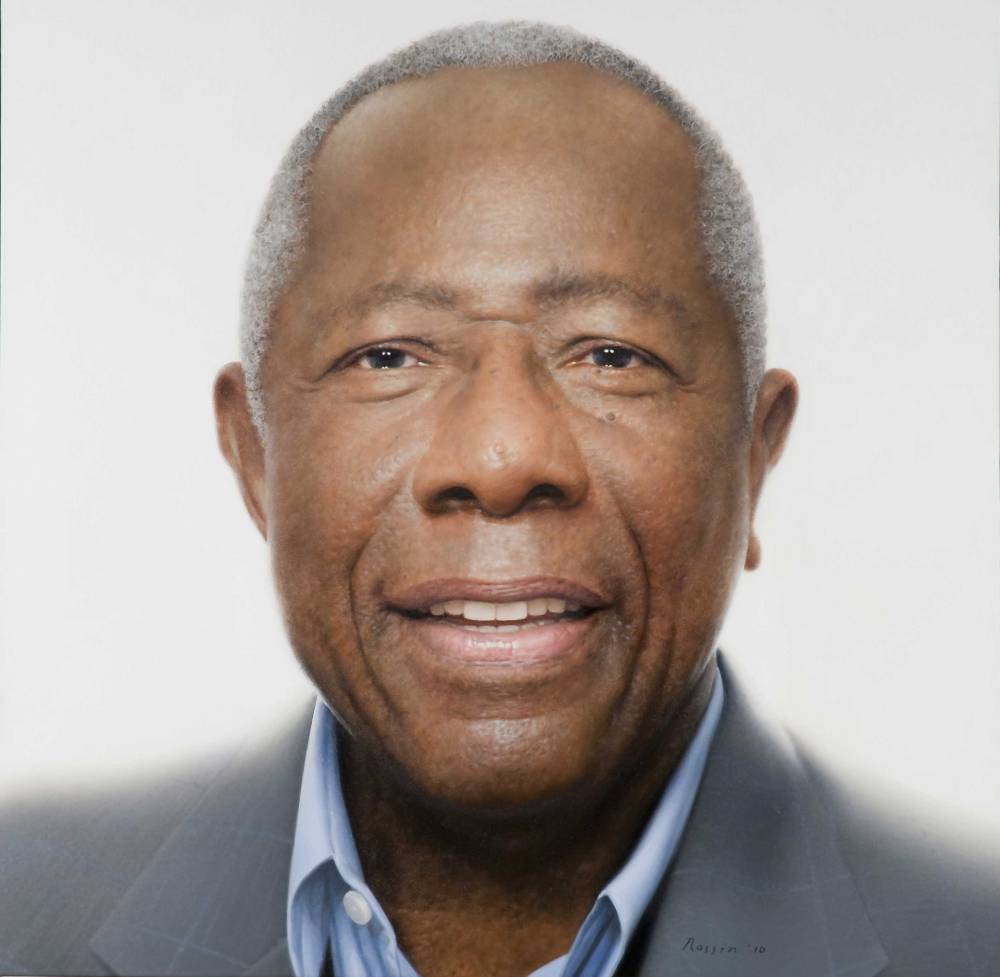Henry Aaron turned 80 on Wednesday, a long life now divided neatly in half by the 40 years building to home run No. 715 and the 40 years spent in service to that epic swing.
Time to celebrate the fully experienced life, one that has enjoyed equal meaning on both sides of the foul pole.
Aaron’s 80th will not pass quietly. In Washington this week, baseball’s all-natural home-run king will be honored at a Friday night dinner thrown by his buddy, Commissioner Bud Selig. On Saturday, he and his likeness will be celebrated at the Smithsonian’s National Portrait Gallery.
Space in that hall is reserved not only for those who can hit the fastball, but those who have, on a grander scale, influenced a nation’s culture. The Hammer did his share of societal shaping with a 33-ounce piece of sculpted ash.
“Can we tell the story of baseball without Henry Aaron? I don’t think so,” Bethany Bentley, a gallery spokeswoman, said. He’ll keep eclectic company, hanging next to actor Morgan Freeman.
The artist who did this and another portrait of Aaron to go in the Baseball Hall of Fame, Atlanta’s Ross Rossin, felt it his responsibility to capture “the positive energy that comes from him, the magnetism, the charisma.
“He is more than a sports star; he is an unbelievable human being who represents the time he lived in,” Rossin said. Aaron will be Rossin’s fourth subject displayed at the Smithsonian, along with Freeman, former U.N. ambassador/Atlanta mayor Andrew Young and poet Maya Angelou.
Even someone who has been honored in nearly every conceivable fashion still can be moved by an event of this scale.
“I was there with Andrew Young when they hung his (portrait),” Aaron said last week. “You’re on a different level when you get there. You’ve achieved a lot and somebody upstairs loves you. I don’t know – you feel like somebody special.” Before leaving for D.C., Aaron sat for an interview in the southwest Atlanta home he has been in since 1974. What emerged was another portrait of an octogenarian sporting icon at ease with the sum of his life.
GENERAL HEALTH
Aaron doesn’t use the tennis court at his home anymore, and in fact jokes about turning it into a garden. Doesn’t fish the five-acre pond out back of the house. But otherwise, “I feel good, I really do,” he said.
Travel can wear him out, but he knows he would feel it all the more had he fully indulged in the pleasures of the road while he was playing.
“I feel fortunate. I feel proud of myself. I’ve tried to stay healthy all my life, tried to do the right things,” Aaron said.
His parents willed him a long life. His father, Herbert, lived to the age of 89. Estella, his mother, made it to 96.
“I wish I knew (the secret to longevity),” he said. “Even when I played baseball, I always felt like I had to take care of myself. If I felt like the night before I stayed out a little later and it kept me from playing the kind of baseball I wanted to play, then nobody had to tell me the next night – or the next two weeks – that I had to get to bed.”
ON BIRTHDAYS PAST
There was nobody doing portraits of Aaron when he grew up in Mobile, Ala., the third of a shipyard worker’s eight children.
Birthday parties were for other kids. Aaron cannot recall any single birthday present from his childhood that left an impression.
There is a sort of pride when he speaks about the humbleness of his background, a wry humor when he declares, “I tell a lot of people I was a vegetarian before they knew what a vegetarian was. We didn’t eat meat but once every two or three weeks.” He never played high school baseball. Certainly never came up playing any kind of organized youth baseball. When he left home to prove himself in the now-long-defunct Negro Leagues, he held the bat wrong (cross-handed) and contradicted his athletic ability by running on his heels rather than his toes. Such a baseball upbringing is unlikely to be duplicated in the ever refined future.
THE BRAVES MOVE TO COBB COUNTY
A portion of the wall over which Aaron launched the ball that broke Babe Ruth’s revered record stands a lonely watch in a parking lot across the street from Turner Field. That’s pretty much all that’s left of Atlanta-Fulton County Stadium, a faint echo of Aaron’s past.
A prerogative of age is an almost instinctual resistance to change. He said he shed a tear when the old stadium was imploded. He’ll be saddened as well when the Braves bug out of Turner Field for their new suburban Elysium.
“I never played baseball in that park, but it seems I’m connected to it somehow,” Aaron said.
“You have people come along, a younger generation, who have no (sense of) history, no care about what happened there. That stadium should always be (at its current site), I think.” As for the preserved section of Atlanta-Fulton County Stadium, the relic from the historic night of April 8, 1974, when Aaron passed Ruth? “I don’t know what’s going to happen to that little wall. Might end up in somebody’s living room,” he said.

